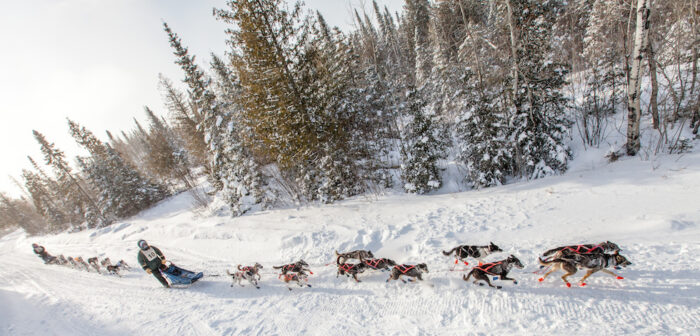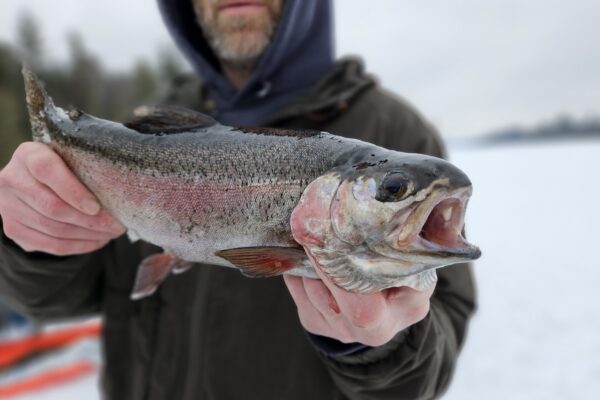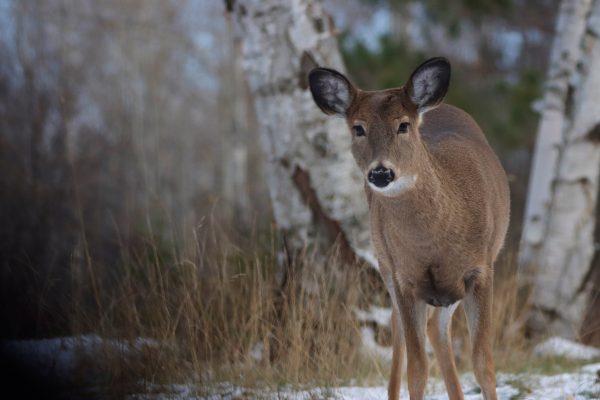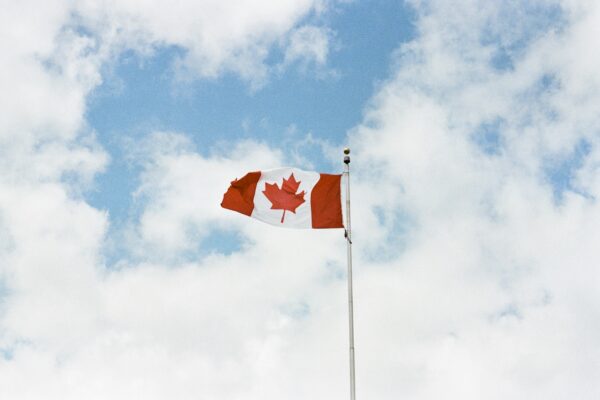Mushers navigate a second winter with sled dog race delays
The 2025 sled dog racing season is off to a similar start as the previous winter.
For the second consecutive year, sled dog race organizers and mushers grapple with race delays or cancellations due to insufficient snow conditions in Minnesota and the Midwest.
The minimal snow conditions and recent sled dog race delays, like the Gunflint Mail Run and the John Beargrease Sled Dog Marathon, have impacted mushers’ training and racing season schedules.
The delays have also put personal career goals and racing milestones in jeopardy.
Last year, Morgan Martens, with Martens Mushing, based in Brule, Wis., hoped to race in the 40th anniversary of the 300-mile John Beargrease Sled Dog Marathon as the youngest musher, at 17 years old. However, last winter, the race’s cancellation prevented him from reaching this personal milestone.
“Last year, I trained the team over 1500 miles in preparation for the Beargrease Marathon, and then it was canceled,” Martens said. “So it was a pretty big bummer.”
This year, Martens set another personal goal: to be one of three 18-year-olds racing in the 2025 John Beargrease.
“It’s been a dream of mine to race in the Beargrease Marathon for just over two years now,” Martens said. Martens has previously raced in the 120-mile Junior John Beargrease. In 2021, he won at age 14.
Martens said he’s staying optimistic that this year’s race will still occur on the rescheduled date of March 2. “We’re just praying we get more snow so it doesn’t get canceled again. We’re definitely ready. We just need the race to happen.”
Training for the John Beargrease and other Midwest races has looked quite different for Martens compared to his fellow mushers in northern Minnesota or Michigan. As of mid-January, Martens said northern Wisconsin doesn’t have any snow. He has trained his sled dogs using a side-by-side or utility task vehicle (UTV). “We’ve been training on the side by side for the longest time now. All of last year and all of this year so far.”
Given the significant weight difference between a side-by-side and a dog sled, Martens said his team of sled dogs will be “super ready as far as training goes.”
This winter, training for the upcoming racing season has also proved challenging for many other mushers. In northern Minnesota, near Ely, Jennifer and Blake Freking, owners of Manitou Crossing Kennels, said while snow conditions are sufficient, it’s “really hard and fast.”
Jennifer Freking said now that the Gunflint Mail Run and the John Beargrease have been postponed, they have adjusted their training schedule, particularly for the yearling sled dogs. The extra time allows the yearling pups to build endurance by running longer distances.
“We’re keeping everybody maintained and slightly increasing in miles,” Jennifer Freking said. Given the compacted snow conditions, Jennifer Freking said the focus while training is to “maintain their endurance without risking injury in these conditions.”
With the rescheduled Gunflint Mail Run and the John Beargrease, the Frekings, like many other mushers, are now navigating conflicting racing schedules. Jennifer and Blake Freking planned to run in the Gunflint Mail Run, but now, with the rescheduled Feb. 8 date, it conflicts with the Wisconsin-based Northern Pines race. In addition, the now rescheduled John Beargrease on March 2 conflicts with the Michigan-based CopperDog sled dog race. “So now our races are all butted up against each other,” Jennifer Freking said.
Despite the conflicts, she said the plan is to stick with the Gunflint Mail Run and the John Beargrease. For the upcoming 2025 John Beargrease, Jennifer and Blake Freking set a personal family goal: to race alongside their two teenage daughters, Elena and Nicole, in the John Beargrease 120.
“We really hope the Beargrease goes if nothing else, because it’s going to be just heartbreaking for our daughters,” Jennifer Freking said. “You don’t get to live those experiences for very long with your teenagers.”
Closer to the North Shore, in the Cramer and Tofte area, musher and owner of Stoney Creek Kennels, Rita Wehseler is also adapting to the race delays and conflicting racing schedules. Wehseler planned to have two teams run in the Gunflint Mail Run and the John Beargrease Sled Dog Marathon this year. Joanna Oberg is the other musher running with Stoney Creek Kennels. Oberg won the John Beargrease half-marathon in 2023 and the 8-dog Gunflint Mail Run in 2022. Wehseler won the John Beargrease 120 in 2022. Wehseler said that, as of mid-January, the plan is to stick with the two races.
With the minimal snow conditions along the North Shore, Wehseler said she has slowed down the mileage while training, given the icy conditions.
“They’re basically running on frozen ground instead of a cushion of snow,” Wehseler said. “So it is harder on them.”
She said, “I’m not speeding them up right now just because I have a little more time for that, and hopefully, we can get a little more cushion for the dogs’ feet and their limbs.”
With the sled dog race cancellations in 2024, Wehseler, who has been mushing for nearly 30 years, said it was the first year she had not participated in a single race. She’s hoping this year doesn’t repeat that same pattern.
“I think the mushers are really looking forward to it because there’s a social aspect to it, too. We only see each other at races,” Wehseler said. “We become friends because it’s a small community of people, and you see the same people at all the races. So it’ll be fun for all of us to get back to racing.”
Despite the 2025 sled dog race delays and insufficient snow conditions, Wehseler, the Freking family, and Martens remain optimistic about the racing season. They trust that more snowfall is on its way and that the Gunflint Mail Run and the John Beargrease Sled Dog Marathon will occur later this winter.
In the meantime, Gunflint Mail Run organizer Cathy Quinn says, “I think at this point, it’s all about the snow dance and getting 12 more inches of snow on the ground.”
WTIP’s Kalli Hawkins spoke with mushers Morgan Martens, Jennifer Freking, and Rita Wehseler about how the race delays impact their training and racing schedules. A produced feature is below.














